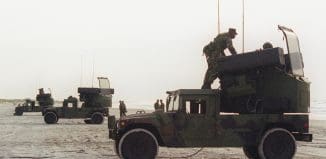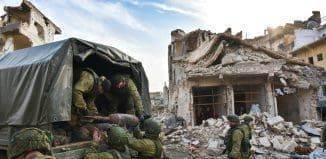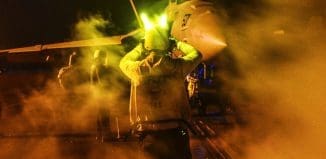The Arab world and the Crisis in Syria
This post is also available in:  עברית (Hebrew)
עברית (Hebrew)
By Joel Guzansky
 Unlike the determined and united response to Qaddafi in 2011 (as a result, among other things, of his attempts to physically harm Arab leaders), which included the use of force on the part of Qatar and the UAE, the Arab countries so far have not taken a firm stand, and have certainly not united against Syria. The Arab world remains divided on the Syrian question, as reflected in both the Arab League’s decision of 27 August 2013 (and the announcement of the Organization of the Islamic Conference the following day), refrained from giving a green light for military action in response to the regime ‘s use of chemical weapons on August 21, 2013.
Unlike the determined and united response to Qaddafi in 2011 (as a result, among other things, of his attempts to physically harm Arab leaders), which included the use of force on the part of Qatar and the UAE, the Arab countries so far have not taken a firm stand, and have certainly not united against Syria. The Arab world remains divided on the Syrian question, as reflected in both the Arab League’s decision of 27 August 2013 (and the announcement of the Organization of the Islamic Conference the following day), refrained from giving a green light for military action in response to the regime ‘s use of chemical weapons on August 21, 2013.
The ambivalent public response by the Arab leaders is meant to protect their interests in the days after the American attack. Behind closed doors they will thank the Americans for helping them in case the attack would impact Assad greatly but wouldn’t cause a large number of casualties, but will blast them if the attack will fail and would be too weak to send the appropriate message to Iran. If the attack went sour – then they had nothing to do with it in the first place.
It was during the summer of 2011 when the Arab world began adopting a more aggressive stance towards Assad. First, the Gulf Cooperation Council, which called for Syria to stop “the deadly repression of citizens,” and then the particularly harsh remarks by Saudi King Abdullah, who demanded to “stop the killing machine.” The turnaround was due to the frustration the Alawite regime had caused the king (an infidel regime as far as he is concerned) after the failure of Saudi mediation efforts, and the realization that that events may tip the balance against Iran. The king’s anger was fueled by deaths in the tribes of his mother and two of his sisters, and the large number of Sunni casualties during the Ramadan.
Over the years Gulf countries have preferred to avoid confrontations and focus on mediation efforts in the Arab world, in order to counteract dangers while trying not to be identified with one camp. They would also prefer American leadership in the Syrian case, but when that didn’t happen the countries whose relative advantages are deep pockets and significant influence in the Muslim world moved into the vacuum created. Until then they failed in their attempts to cut Assad off from Iran. The Syrian revolt gave them a unique opportunity to weaken the Iranian front.
Since then, Saudi Arabia, with some coordination with Qatar (who reduced her involvement in the crisis over time) and the Emirates although not in complete agreement with them, provides assistance to “moderate” (according the the them) forces among the rebels. This is done, sometimes, regardless of U.S. restrictions on arming, and with a clear intention to draw the United States into greater involvement. Despite a common interest in overthrowing Assad, Qatar’s regional activism is anathema to Saudi Arabia. This is evident in the words of Prince Bandar, the Saudi intelligence chief and the coordinator of efforts in the Syria arena, recently described Qatar as “Three hundred men with a TV station.” Qatar’s support of radical elements among the rebels may lead to the Saudis doing so as well (while keeping a low profile to prevent criticism), to gain power in their midst and to balance Qatar’s influence.
Even if they don’t admit it, a limited U.S. attack is not fully consistent with Arab interests. There is concern, particularly in the Gulf, that a limited U.S. attack will have a result similar to the American attacks in Iraq in 1993 and 1998, which left Saddam in his chair and caused him to increase the oppression of his people. Toppling Assad (and weakening Iran and Hezbollah) became the major strategic objective for them. The goal is to strengthen elements within the rebels, so that if and when Assad will fall they will take control of Syria – or what’s left of it.
Gulf states tried to convince the Americans that the Assad regime has crossed Obama’s “red line”, mentioned by the American president in August 2012 and again in March 2013, concerning the use of chemical weapons. According to Wall Street Journal reports the Saudi intelligence had presented the Americans with evidence of chemical weapon use back in in February 2013. In general, American passivity and unwillingness to involve themselves in Syria brought the monarchs to doubt the commitment and credibility of the U.S., their main security “provider”, and that in addition to the American difficulties with Iran, Afghanistan and Iraq, statements regarding “moving towards Asia” and future energy independence in the United States. The Saudi king, frustrated with the American policy in the region, sent a message to President Obama recently, and stated that “American credibility is on the line, in the region and beyond.”
iHLS – Israel Homeland Security
The Saudis are not talking about a landslide victory any time soon, they are aware of the advantage of Assad and his allies in terms weapons, organization and foreign support. They do hope, however, that thanks to assistance they give every day that passes tips the balance in their favor: Their enemies – the Assad regime, Iran and Hezbollah – are weakened, so far, with no significant losses. However, there is considerable concern, as past experience shows, that radical elements operating in Syria may return to their home countries and undermine stability. In addition, the fall of Assad may indeed, according to many Arab countries, curb Iran and “restore her to her natural borders”, but also stir up conflict against it . This concern has resulted in Saudi Arabia and Kuwait, among others, raising the alertness levels in the militaries to one level below the highest.
The Arab world, suffering from long periods of strife and conflicts, failed to adopt a clear and unified strategy on the Syrian issue. The result: A weak statement by the Arab League, which has suspended Syria from the organization in 2011 and gave the chair to the opposition – ” in order to put an end to violations of law and extermination crimes” committed by the Syrian regime, without calling for military actions and for Security Council intervention. Four countries stand against Saudi Arabia, Qatar and the UAE, preventing any harsher response: Algeria, which backed the Assad regime for the past two years; Iraq, who allowed Iranian shipments to Assad to pass through its territory; Lebanon, fearing the reaction of Assad and Hezbollah combined; and Egypt, attempting to retain a measure of influence Syria. These four opposed any harsher methods of response by the Arab world.
Due to turbulence in the region the Bay Area has become a central issue on the Arab agenda. Gulf states, once overshadowed by Cairo and Damascus, are now the most stable and unified bloc in the region – despite the considerable differences between them and the social-political pressures in their territories. Monarchies often acted as a revolutionary force – and sometimes anti-revolutionary – according to their own interests. The concocted the deal to oust Yemeni President Saleh from office, they were involved in establishing the new regime in Tunisia, and helped – perhaps more than any other Arab element – to overthrow the Qaddafi regime. On the other hand, they were fierce supporters of Al-Khalifa rule in Bahrain and sought to maintain the Mubarak regime in Egypt. After Mubarak fell they proceeded to transfer billions to the military government who recently seized power in Egypt.
Make no mistake, the Sunni Arab region is hostile to the Assad regime, as indicating by a survey conducted even before the attack on August 21, 2013. 90% of Lebanese Sunnis, 90% of Jordanians and 81% of Egyptians hold a negative opinion about Assad. However, as the date of the American attack grew nearer even regimes who supported an attack behind the scenes tried to distance themselves from it – thus blocking American efforts to gain legitimacy for such an attack. Jordan, fearing a Syrian remuneration, announced that its territory will not be used as a base of operations by U.S. military personnel staging attacks in Syria. Egypt, although condemning the use of chemical weapons, declared that a political solution – not military – is the only way. American and Gulf pressure and brought Arab foreign ministers to convene again on September 1st 2013, hoping to adopt a more assertive stance and establish support for the American position.
Mabat Al, issue 461, 1st September 2013































